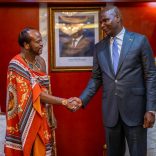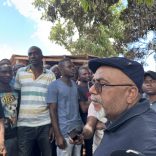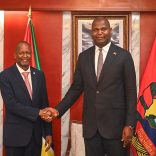Mozambique and Eswatini promise to boost cooperation
Mozambique: President highlights efforts to bring peace

FILE - For illustration purposes only. [File photo: TVM]
Mozambique’s President Filipe Nyusi highlighted on Sunday “efforts” towards pacification as one of the main milestones of his government as he marked the third year of his second term of office.
“When our government started in 2015, there was still a record of attacks [in central Mozambique]. We had a war, and nobody was at peace,” the head of state said at a press conference called to mark the third year of his second term of office in Maputo.
According to Filipe Nyusi, in his cycle of governance, peace has always been a priority, especially with regard to the armed conflict with the Mozambican National Resistance (Renamo), the largest opposition party that maintains an armed wing, now under demilitarisation.
“We had to work, and we have reached the stage we are at: where our brothers from Renamo no longer live in the mountains,” the Mozambican head of state added.
Although Filipe Nyusi pointed to the results of the negotiations with Renamo as a milestone, the closure of the central base of the party’s armed arm in the Gorongosa mountains was, in December, postponed due to delays in the pensions that should be paid to the demobilised guerrillas.
The Disarmament, Demobilisation and Reintegration (DDR) process is part of the Peace and National Reconciliation Agreement, signed on 6 August 2019, between the Mozambican head of state and the then Renamo leader, Ossufo Momade.
The understanding, which provides for covering 5,221 Renamo guerrilla members, was the third between the government of the Mozambique Liberation Front (Frelimo) and the main opposition force, all signed following cycles of armed violence between the two parties.
According to Filipe Nyusi, the third year of his second term of office was also marked by terrorism in Cabo Delgado, a “new” challenge for Mozambique.
“It was a new point, our country has never experienced terrorism. We are containing and managing it to ensure that the country remains stable,” he said, recalling that terrorism is a “universal phenomenon”.
Cabo Delgado province has been facing an armed insurgency for five years, with some attacks claimed by the extremist group Islamic State.
The insurgency has led to a military response since July 2021 with support from Rwanda and the Southern African Development Community (SADC), liberating districts near gas projects, but new waves of attacks have emerged south of the region and in neighbouring Nampula province.
The conflict has left one million people displaced, according to the United Nations High Commissioner for Refugees (UNHCR), and about 4,000 dead, according to the ACLED conflict registration project.












Leave a Reply
Be the First to Comment!
You must be logged in to post a comment.
You must be logged in to post a comment.